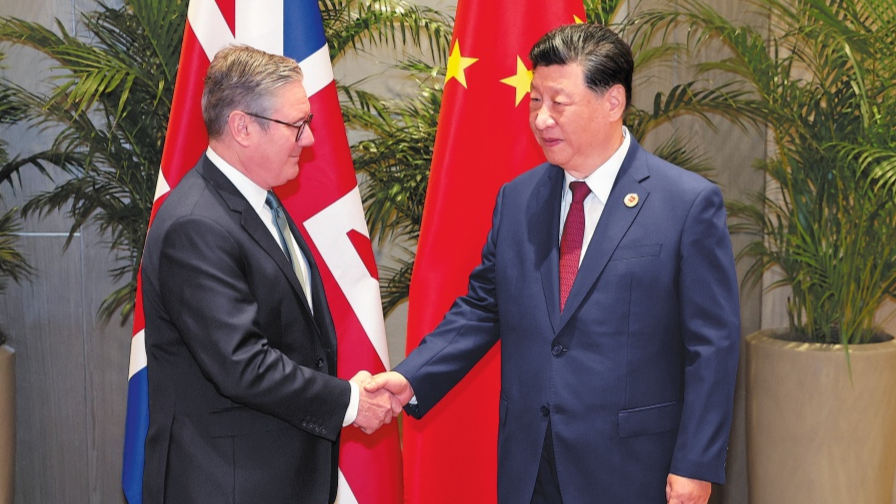Leaders' meet sends promising signal, expected to foster growth, experts say

Experts said the dialogue between Chinese President Xi Jinping and British Prime Minister Keir Starmer on the sidelines of the G20 Leaders' Summit on Monday underscores the vast potential for more China-United Kingdom collaboration.
This was the first face-to-face meeting since Starmer took office as prime minister in July. In recent months, China and the UK have seen good momentum in exchanges at various levels, as senior officials from the two countries, including ministers, have held talks covering areas such as foreign policy, the economy, finance, and energy.
READ MORE: Xi emphasizes pursuit of common development
Observers said the meeting in Rio de Janeiro signals a promising trajectory, where those taking part in China-UK exchanges expect these discussions to translate into concrete actions, fostering sustainable growth and technological advancement for both nations.
Jack Perry Junior, chairman of the 48 Group and CEO of London Export Corporation, said both nations, recognized for their technological innovation and forward-thinking strategies, have a unique opportunity to drive high-quality development initiatives.
"Historically, partnerships in sectors like finance and education have yielded mutual benefits. This renewed engagement can pave the way for deeper cooperation in emerging fields such as green energy and digital innovation," he said.
"President Xi's emphasis on high-standard opening-up and extending zero-tariff treatment to least developed countries aligns with the UK's commitment to free trade and economic inclusivity," Perry said, adding the UK's move not to impose tariffs on the Chinese EV industry and not follow the EU approach shows that "the UK is doing what is best for its people and businesses".
Perry said there will be broad cooperation space where the UK could participate in China's eight actions to support global development, including pursuing high-quality Belt and Road cooperation.
"The Belt and Road Initiative is evolving into a more mature and sustainable framework, with its emphasis on a green and digital Silk Road. This signals China's understanding of global economic shifts and its desire to move from quantity to quality. For the UK side, this represents an opportunity to integrate our world-class financial expertise and green technology solutions into this ambitious network. Projects like these could set benchmarks for multilateral cooperation and elevate global infrastructure standards," he added.
Encouraging step
H-J Colston-Inge, the co-founder of the Chopsticks Club, a British network for China-related professionals, and a director of the educational charity Engage with China, said she is encouraged that the two leaders have created a space to meet.
"In my opinion, China and Britain — and the West more broadly — need engagement not only for the common good, but also for cultural enrichment, the development of knowledge and to encourage vital collaboration on climate change.… I hope that these high-level summit talks will be more than a backdoor to shifting the geopolitical climate but an open door to a new chapter of more positive bilateral relations," she said.
Engage with China works in UK schools to build a greater understanding of China among young people to enable school children to immerse themselves in Chinese culture.
ALSO READ: Chinese ambassador hails economic partnership with UK
Increasing trade and boosting communications are "in all of our interests and may just help to stimulate thinking around what economic growth of the future might look like in a world with finite resources", she said.
In an interview with CGTN Europe aired on Tuesday, Kerry Brown, professor of Chinese Studies and director of the Lau China Institute at King's College, London, said he thinks the current British government is clear-sighted, and puts the economy as its priority.
"It knows its priority is trying to do something about Britain's productivity issues. As the world's second-biggest economy, China must play a role in that. Either we say, yes, we want China to play a role or we say, no, we'll be able to deal with our economic problems ourselves," he said.
"Either way, you have to make a decision, and this government has made a pragmatic decision. … I think it's the only decision really that makes sense. And I hope that it is able to develop a rational, consistent approach to China that balances problems with opportunities."


